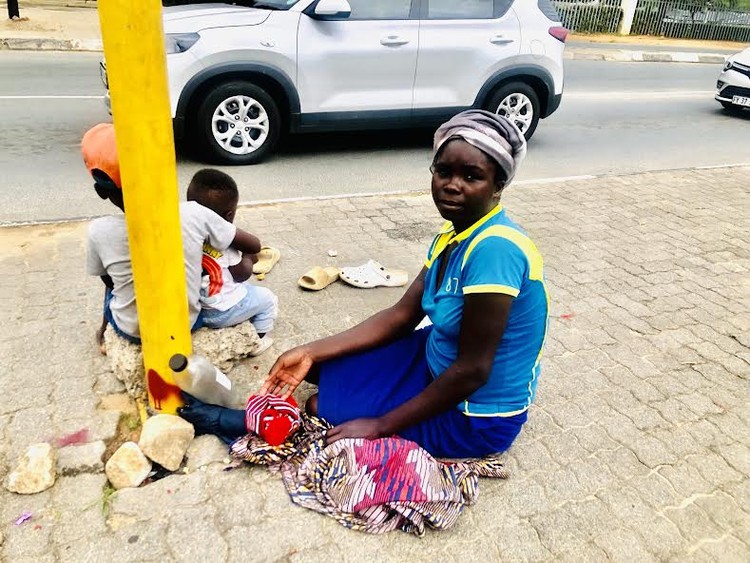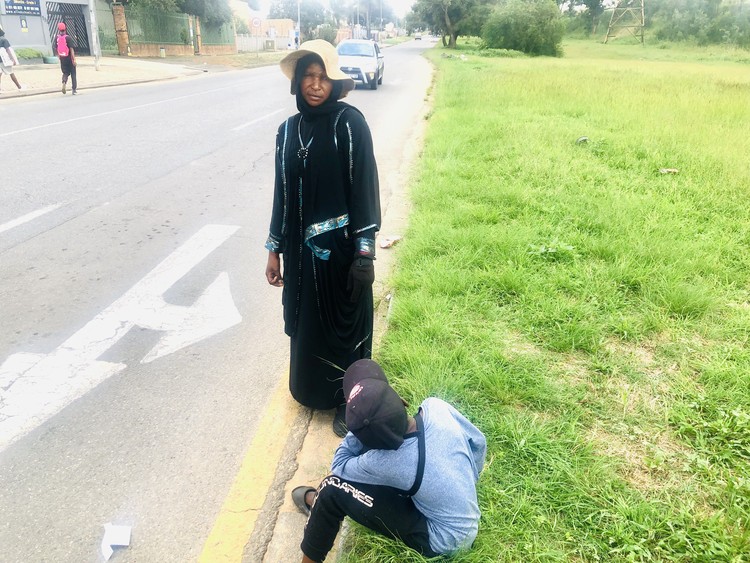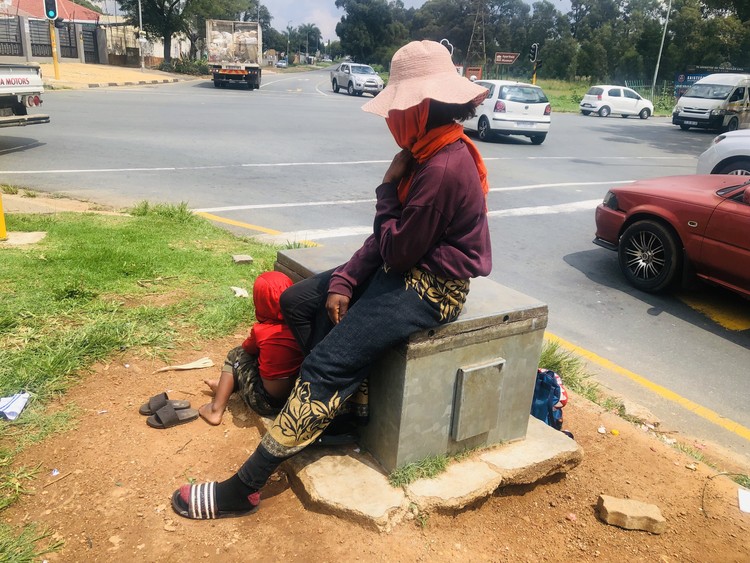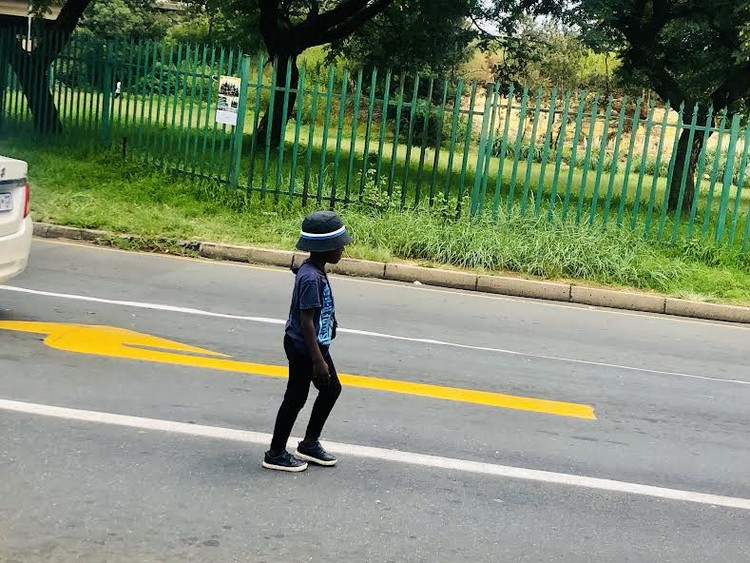Begging to feed their children
Women who beg at traffic lights with their children say they have no other options
Lucia Mhlanga sits at a traffic light in Johannesburg with her two children. Photos: Kimberly Mutandiro
- Scores of women in Gauteng beg for money from motorists at traffic lights.
- Many are immigrants struggling to find work.
- But Johannesburg Metro Police and social workers say this violates traffic bylaws and children’s rights, and often move the women off the street.
- The women say they have no alternative.
Every day at 7am, Lucia Mhlanga, her husband Douglas Mukandi, and their two children aged 1 and 7, leave their home in the Car Centre informal settlement. The family, from Mozambique, walk for two hours to upmarket suburbs in Randburg. Mhlanga walks with the baby on her back and carries a small bag packed with lunch. Her husband holds the eldest child’s hand as they cross the streets.
Mukandi stops at an intersection on Bellairs Drive, where he sits with other men at the traffic light in the hope of being offered temporary work by passing motorists. His wife and children walk to traffic lights at the corner of President Fouche Drive and Windsor Way to beg for money or food from motorists. Mhlanga sits watching her children, occasionally standing up to stretch her legs or to take them to the toilet at a nearby garage.
Some days she gets R50 or R100, and some days she gets nothing.
GroundUp met Mhlanga on a windy Friday afternoon as she sat at the traffic lights with her children. For almost an hour, none of the passing motorists offered her anything. It was a “dry day”, she says. But she says she has no other way to raise money to help her husband pay rent and their son’s school fees.
“There are no jobs in Mozambique; my husband and I came to find work.” She last had a casual job in 2024.
She is among scores of women who sit at traffic lights around Gauteng with their children in the hope of attracting sympathy from passing motorists. Some are domestic workers who lost jobs during the Covid-19 pandemic and have struggled to find work.
Increasingly though, the women say, Johannesburg Metro police and social workers have been moving them off the streets, accusing them of violating traffic bylaws and children’s rights.
Sometimes they are detained at the police station for several hours. Sometimes social workers threaten to take their children away. But the women say they have no alternative but to come back to beg.
Mhlanga said she now avoids the places police and social workers frequent.
“I can only stop coming to the traffic lights if I get a job,” she said.
Threats and slurs
Women standing at traffic lights in Booysens, further south, told GroundUp that some of them had found donors at the traffic lights to pay their children’s school fees. But they say police threaten them with arrest.
Some claim that officers and social workers make xenophobic remarks, threatening to deport them back to their home countries.
“All we want is to raise money for food and to pay school fees for our children,” said Moira Musoja, a single mother of four from Zimbabwe.
She claims social workers have threatened to take her children away, and police have told her to take her children and go back to her country.
Musoja said on most days, she and her youngest child walk more than 7km from their home in one of Joburg’s “dark” buildings to their spot along Kimberley Road in Booysens. If there is a little money left over from the previous day, they catch a taxi. Sometimes, they hitchhike. Usually there is little to spare after buying food and paying rent.
Before the pandemic, Musoja could get casual domestic work from motorists at the traffic lights for a few days a week and could afford to pay school fees for her children. She even had a donor who paid her son’s school fees for several years.
Now casual work is harder to get and two of her children have not been in school for more than three years. Her daughter has been going to school for the past two years, again with the help of a donor.
Musoja said there was a day in November last year when police came with social workers and closed off the area. Women and children were put into vans and taken to a children’s home in Soweto. She said their phones were taken away. They were detained until the early evening without food and then released.
For Moira Musoja, standing at the traffic lights with her children has become a routine.
What will my children eat?
In January, Musoja and other women were arrested and detained at the Booysens police station for a full day.
“If I stop coming to the traffic lights, what will my children eat? I will never give them to social workers,” she said.
Faith Shava’s husband died in 2021 and she has been struggling to look after their four children, two sets of twins aged 4 and 6. In 2022 she joined other women at the Booysens traffic lights. Occasionally she gets casual work or sells clothes gifted by well-wishers. She manages to pay her R1,000 rent, but struggles with school fees for her older twins.
Her six-year-old son has become accustomed to walking in between vehicles asking for help.
Police detained her and the children in February.
“My children are now traumatised. When they see police, they run away. Police and social workers should leave us and our children alone,” said Shava.
Faith Shava struggles to look after four children.
“Solutions”
Johannesburg Metro Police Department spokesperson Xolani Fihla said begging at intersections could disrupt traffic and expose children to pollution and danger.
“There are concerns that some individuals, including children, may be victims of exploitation or human trafficking,” Fihla said.
“Social services are involved to assess the needs of the individuals and families encountered and to provide appropriate support and interventions. The goal is to provide a more sustainable solution than street begging.”
He said by-laws prohibited activities which disrupted traffic flow, but “those who are found at the intersections are not arrested”. Rather, the Johannesburg Metropolitan Police Department (JMPD) is allowed to remove people from areas where they were obstructing traffic or breaking the city’s bylaws.
He said removing children from their mothers had to be in accordance with the Children’s Act “and other relevant legislation”.
“Xenophobic remarks by law enforcement officers are unacceptable and unlawful. Such remarks constitute a violation of human rights and are grounds for disciplinary action. If such comments are made, it is imperative that the victims report them and that the JMPD investigate them thoroughly.”
Gauteng Department of Social Development spokesperson Teddy Gomba said in terms of the Children’s Act, the department had a legal obligation to ask mothers with children on the street why they were there.
“Should we find that the mother is destitute, then efforts to assist the mother and child are put in place.” He did not say what efforts were made.
“It is worth noting that municipalities also have their own social development units and thus employ social workers, too. Our work with municipalities is supportive and collaborative,” Gomba said.
City of Johannesburg spokesperson Nthatisi Modingoane said it was suspected a syndicate might be dropping mothers off at intersections and using them and their children. However, no evidence was provided for this claim, and Modingoane said it had not been proven.
Modingoane said “awareness is created” through the social development department to ensure women understood they put their children at risk.
“Children can easily run into the street.”
Six-year-old Ethan Shava has got used to walking between cars at the intersection to ask for money.
Support independent journalism
Donate using Payfast

Don't miss out on the latest news
We respect your privacy, and promise we won't spam you.
Next: Understanding the court ruling on apartheid-era crimes
Previous: Fight over fish in Lesotho’s Katse Dam
© 2025 GroundUp. This article is licensed under a Creative Commons Attribution-NoDerivatives 4.0 International License.
You may republish this article, so long as you credit the authors and GroundUp, and do not change the text. Please include a link back to the original article.
We put an invisible pixel in the article so that we can count traffic to republishers. All analytics tools are solely on our servers. We do not give our logs to any third party. Logs are deleted after two weeks. We do not use any IP address identifying information except to count regional traffic. We are solely interested in counting hits, not tracking users. If you republish, please do not delete the invisible pixel.




